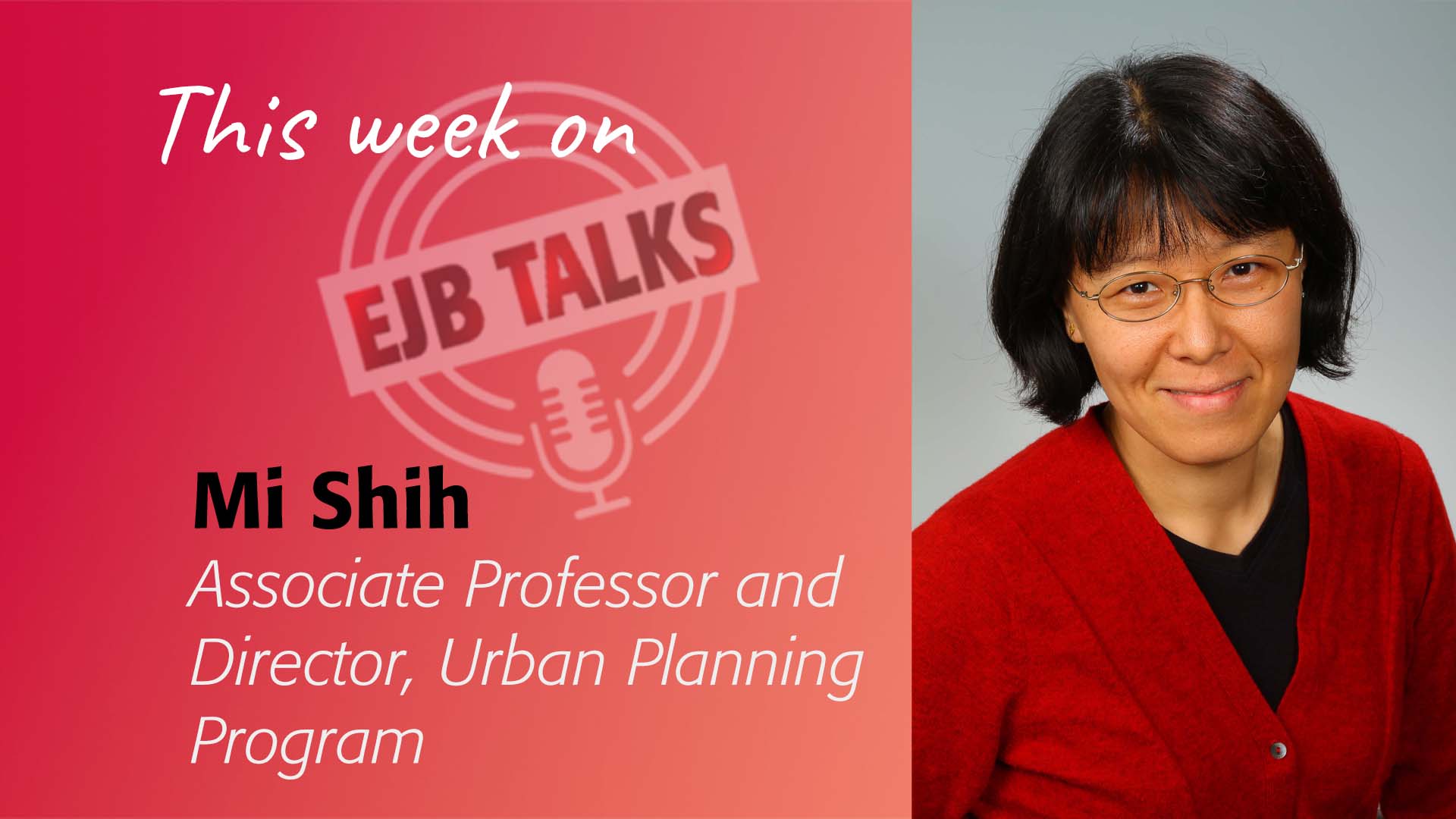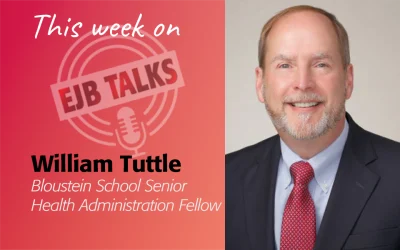Urban Development and Density in Taiwan: EJB Talks with Mi Shih
EJB Talks returns for its 11th season! Today Dean Stuart Shapiro interviews Professor Mi Shih, the director of the school’s nationally-ranked urban planning program, about her work on urban development globally, with a focus on Taiwan. Mi discusses her interest in urban planning and the tension between populism and expert decision-making. She explains the concept of “density bonusing” in Taiwan, a planning tool where developers receive more development rights in exchange for public benefits, and critiques the lack of transparency and community involvement in these processes. Mi and Stuart also talk about the motivations of today’s urban planning students to make a difference in the work they are doing, emphasizing the importance of connecting knowledge to action for the public good.
Transcript:
Stuart Shapiro
Welcome to the 11th season of EJB talks. 11 seasons!
I am Stuart Shapiro, the dean of the Bloustein School, and the purpose of this podcast is to highlight the work my colleagues and our alumni in the fields of policy, planning and health are doing to make the world a better place.
We are going to start this season by speaking with the director of our world ranked urban planning program, Professor Mi Shih. Mi studies urban development in Taiwan and globally. Welcome to the podcast, Mi!
Mi Shih
Hello, Stuart, thank you for having me!
Stuart Shapiro
My pleasure! Well, we are going to start with the kind of question I always start with, which is, let’s get a little bit on your background, and what got you interested in urban planning?
Mi Shih
Yeah, sure. So you know, I am originally from Taiwan, and Taiwan is one of the so called “developmental states.” So I am always interested in how governments and governance work. I’m always interested in large political, economic and policy processes. Those are some of the topics that always fascinate me. For example, large-scale land development projects backed and supported by the state, peri-urbanization, market-oriented urban policies. And I’m also interested in the questions such as, why do experts know what they are doing? (laughing) Where does their confidence come from?
But on the other hand, I am also always interested in the diverse ways of how people live their urban lives. How do people make do, get by, eek out? How do they make sense of the kind of regulations, rules or special orders imposed on them? And then planning is just the right field that these two very different sets of issues come together. So that’s a perfect fit for me.
Stuart Shapiro
Yeah, you know, it’s funny in our present moment. I’m not sure how different those sets of issues are, right?
Mi Shih
Yeah.
Stuart Shapiro
Where experts get their knowledge from, and why they can express confidence, and how people live in the state. You know. That’s a lot of the tension we see right now between populism and expert elitism. And so I think they’re very much connected.
Mi Shih
Yeah, definitely, yeah. It is an interesting moment that we are living in right now.
Stuart Shapiro
And it’s true worldwide. I mean, we say, you know, I obviously think about it mostly here in the United States, but you see it across across the world. With that in mind, when you meet new planning students here or potential planning students, what do you say to get them interested in urban planning?
Mi Shih
Almost… so when our students come to us, they are already very interested in planning. They may not be able to tell you exactly what their interests are, but you can tell that they are energetic. They are very smart. They are engaged and they are engaging. And I think what really, what really fires them up is that they want to…they are interested in problem solving.
There are older, wicked problems that have been with us for a long while, right? And our students see that, well, the urban world is not quite working the way it is supposed to be? And the impacts are uneven. And already-disadvantaged communities face more challenges and receive fewer benefits. And wealthy communities seem to be doing better ever since.
And there are also new challenges. Climate challenges, sea level rising challenges. So they want to know how to solve problems, right? And that is, that’s why they come to us.
Stuart Shapiro
Yeah, I love that problem solving framing there, and it’s usually with an aim of making people’s lives better. Is that, right? That’s, that’s the goal for many of them.
Mi Shih
Yeah, yeah, exactly. And I just think that it is so crucial that they just want to make the world a better place. They just want to find ways to do planning better. To make the situation less problematic. And I think that is just truly important, because when you have a 9-to-5 job, you get tired, right? And that commitment, I think, is what gets you going.
Stuart Shapiro
Yeah, there’s so many frustrations you have to sort of be able to keep your eye on why you’re doing what you’re doing. For sure.
Mi Shih
Yes! Sure.
Stuart Shapiro
It’s true of us as well, no doubt. I don’t have to tell you that. So I want to turn to your research a little bit because I want to give you a chance to talk about that. So explain to us. Looking at your abstract and some of your articles there. And you use this term “density formulas” and their use in Taiwan. What does that mean?
Mi Shih
Right, so let’s start with “density bonusing.” So, and this is globally, this is a very popular planning tool. So what density bonusing does is essentially, that local community… oh sorry, local planning agencies, or local planning authorities, give real estate developers more development rights so they can build taller, they can build bulkier, in exchange for privately funded public benefits.
So for example. I let you build taller. Taller than what the existing zoning codes allow. But you build a couple of units, or a couple of or a couple more hundreds of units of social housing for me. Or you provide some community facilities for me. Or you provide some job opportunities. So this is the idea behind density bonusing. And this is just, globally, a very popular planning tool.
Stuart Shapiro
Yeah, we definitely see, see it in the United States.
Mi Shih
Yes
Stuart Shapiro
In many forms. It’s not… I don’t know that I’ve seen that term. But certainly we see concessions to developers in order… in exchange for other things all the time.
Mi Shih
Yeah, and as federal funding becomes, you know, less and less frequent. And as cities turn to entrepreneurial governance, we can totally imagine that this kind of planning tool is very seductive, right? Financially, even politically, very seductive. But this is usually down on a negotiation basis.
Stuart Shapiro
Right.
Mi Shih
So the planners, local communities affected, or potentially will be affected, by the new development. And the developer they, you know, they negotiate, right? So could be a pretty messy process, right? So what a density formula means is that, it is a predetermined rule that dictates what the developer needs to do in order to receive more building rights.
Stuart Shapiro
Okay.
Mi Shih
So essentially, planners just say that, well, you need to do X and Y and Z.
Stuart Shapiro
Right.
Mi Shih
And in return, I will let you build that much more. So the communities are completely left out of this process. And Taiwan has a very fairly elaborate density bonusing, let me call it, regime. And it has many, many different kinds of formulas. You build social housing, I give you that much more. You build community facility centers, I use a different kind of formula. You build a building that meets the government’s smart building certification standards, then I give you this much. So everything is done through formulas.
Stuart Shapiro
And where do these formulas come from?
Mi Shih
Yeah, that’s the interesting question, right? Well, these formulas come from planners, right? So, for example, there’s one very interesting formula that I’ve been following. Which is a formula that planners use to encourage large site development. So according to… so the existing zoning ordinances say that, well, the minimum lot size is, for example, 500 square meters. Taiwan is very, fairly highly densely populated, right? But if you have… if you do a development that the site is 3000 square meters, I will give you just a lot more density. Actually, the formula says that I will give you 15% more density.
Stuart Shapiro
I see.
Mi Shih
And then I ask them why?
Stuart Shapiro
Yeah, where does that number come from?
Mi Shih
Yeah. They say, Well, no straight answers. So it’s a magical kind of, some kind of magical number.
Stuart Shapiro
A fudge factor!
Mi Shih
Yeah. And I asked them, so why do you like large site development, right? What’s the basis on which you use the public policy to support certain kind of development behavior? And the answer is that, well, because we think large site development is good for the city.
Stuart Shapiro
(laughing) So it’s circular reasoning, almost, yeah!
Mi Shih
Yes, but you can see that planners’ professional preferences and planners’ own value judgments are very much baked in this kind of public policy. And it is problematic.
Stuart Shapiro
Right. And in Taiwan, what has the experience been of the community reaction to this? Is this, you know, do they even know these things exist? The buildings just go up? Or is there fighting against this stuff? How is it played out?
Mi Shih
Yeah. So usually people don’t know until after the fact, because everything is done through formulas.
Stuart Shapiro
Right.
Mi Shih
And who will pay attention to formulas? They are not the most interesting things. (laughing)
Stuart Shapiro
Oh, come on. (laughing)
Mi Shih
People know after the fact, and it’s too late for them to ask questions, right?
Stuart Shapiro
Right.
Mi Shih
But people also are very mindful of their property values, right? So they also see, they also see upside of this, right? The entire city seems to become more property-led. Well I’m trying to argue through my research that actually, the entire city is paying a price for this kind of public policy. Because this kind of public policy makes land and housing markets very hot. So all of us… so housing has become a lot less affordable.
And for certain people, this might not be a problem. If you are already a homeowner, you would like to see the value of your apartment go up.
Stuart Shapiro
Right.
Mi Shih
For younger people, for people who need to rent, for low income people. This is crucial. This is a very serious challenge. So we are actually, collectively, paying a price for this. It’s just that we don’t know. Because the way the public policy is set up makes it… it makes it more difficult for the public to raise questions about it.
Stuart Shapiro
Yeah, and that may even be the purpose in some ways, right?
Mi Shih
Yeah, yeah.
Stuart Shapiro
All right, let’s go back to planning more generally and the program. What you know, given your background, given your research, what’s the message you try to convey to students as they go through the program and begin to consider their career in urban planning? Yeah, so
Mi Shih
I always tell students that planning is a truly very exciting field to get into. And I personally also think so, and that’s why I got into planning, right? And one important reason is because planning is about connecting knowledge to action for the public good. And I think that is truly fascinating, because we re-inform how we understand the world through our actions and practices. And I think other… this is what separates planning from other fields. And because the urban world is diverse and changing, it is important for us to be a critical thinker. But while at the same time, it is also important for each of us to build our own toolbox so that we have tools to do problem solving, to answer questions, to assess outcomes on the ground. So I think that, you know, that connection between knowledge and action, between theory and practice. I think that makes planning truly fascinating and actually impactful. And yeah, and I think that’s what people are excited about planning,
Stuart Shapiro
Yeah no, while it’s true that we have a nice number of planning students. I think there are a lot of people out there that would like the field more if they you know, if they knew that. If they knew that that was what it was about, and such. And part of our job is to is to do that. So hopefully some of them are listening to the podcast today.
Mi, thank you so much coming on.
Mi Shih
Sure! Thank you Stuart!
Stuart Shapiro
A big thank you as well to our producer, Tamara Swedberg, and to Karyn Olsen. We’ll see you next week with another talk from another expert at the Palestine school. Until then, stay safe.




